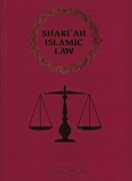Shari'ah – Islamic Law
by Abd ar-Rahman I. Doi revised and expanded by Abdassamad Clarke
This book by the late ‘Abd ar-Rahman I. Doi, may Allah be merciful to him, has long been essential in English. Ta-Ha Publishers felt that it was, however, long overdue a new edition.
Apart from editing it, my work has principally been as follows:
1. To use throughout the translation of Qur'an by Abdalhaqq and Aisha Bewley, The Noble Qur'an: a rendition of its meanings in English. This is not only because of the excellence of its English but also because of its scholarship and its drawing on the corpus of traditional commentaries on the Qur'an, so that it is the most reliable and orthodox translation, as well as the most readable.
2. To locate and ascertain all the hadith used and to translate them with reference to the standard commentaries.
3. I have used Ibn Juzayy al-Kalbi's Taqrib al-wusul ila ‘ilm al-usul for some of the passages on the usul al-fiqh, his al-Qawanin al-fiqhiyyah for many of the passages of fiqh, particularly because of his presenting the positions of the four madhhabs in the context of the agreement (ijma‘) of the scholars, and his Kitab at-tashil li ‘ulum at-tanzil as one of the most reliable tafsir works on the Qur'an, all in my own translation.
There are quite a few other sources drawn upon, such as the tafsir of al-Qurṭubi, the Hashiyah of ad-Dasuqi on the Sharh al-kabir of ad-Dardir, al-Waraqat of al-Juwayni and a number of other sources, and where possible I give them in my own translations from the Arabic.
4. I have also used Aisha Bewley's unpublished translation of the Risalah of Ibn Abi Zayd al-Qayrawani which is generously available from her website. This is because the author drew on the Risalah a great deal, and not only in the places where he acknowledged it, but in many other passages of the work, presumably because of his close acquaintance with it in Nigeria.
The original intention was simply to revise and typeset the book, but as work progressed it became clear that this would not be sufficient, and Ta-Ha Publishers came to feel that so much new work had been done that it warranted the addition of my name as co-author. Certainly, I did not wish to ascribe to the author opinions that were not his, and wanted as much as possible to remain true to his intent and approach in this book. I hope I have been somewhat successful in that, but it has undoubtedly not been completely possible.
The book is a significant one, working, as it does, through the mu‘amalat or ‘ordinary transactions' of the Shari‘ah, sometimes giving the judgements of the four schools and the major ‘ulama', which is very necessary for us in this day if only to have a good general knowledge of the din, but also so that we can show the correct respect for the judgements of the four schools and courtesy towards each other. This is, however, in no sense to encourage the kind of mix-and-match, do-it-yourself Shari‘ah that has been prevalent in recent decades.
The book clearly does not contain the entire Shari‘ah because it does not include the acts of worship since they have been so thoroughly treated elsewhere. Moreover, this book cannot be regarded as an exhaustive treatment of the subject matter in the sense that might be expected of a ‘manual'. It is, however, a serious introduction to something the committed student would have to pursue with properly qualified teachers, preferably in a traditional setting, and in the medium of the Arabic language.
It would have been impossible to complete this book without the help of a number of other people, first of all the publishers, Mr Afsar Siddiqui and his daughter Dr Abia Afsar-Siddiqui whose support throughout the project and determination to see it completed to the highest possible standards was indispensable. Then I would like to mention the help of my wife Suád Østergaard whose careful reading and editing of the first draft was vital. Shaykh Ali Laraki al-Husseini gave great help in the most difficult passages in the book on the subject of inheritance, and I am grateful to Hajj Uthman Ibrahim-Morisson for advice that helped to shape the final form of the book.

